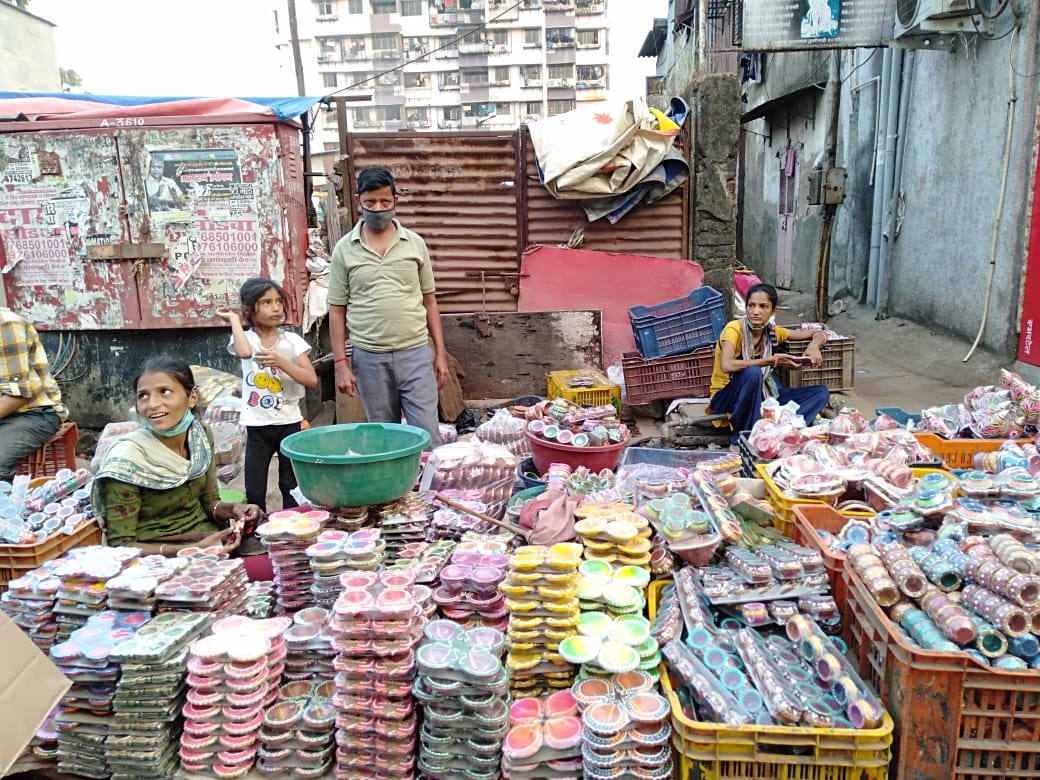INDIA. Kumbharwada, Mumbai: Due to the coronavirus-induced lockdown, traders in the largest pottery market in India are witnessing a slump in the sale of traditional Diwali earthen lamps (diyas). Diwali is the festival of lights and one of most celebrated festivals in India.
Generations of potters inhabit colony in Mumbai
The traders in Kumbharwada (potters’ colony) have been supplying diyas throughout India and are the leading exporter to the UK, China, USA, Canada, and UAE. These skilled craftsmen are from generations of diya-makers originating in Gujarat.
Located on nearly 22 acres of land, more than 1400 families of potters live in a single colony with workshops on the ground floor and residential space above. The Diya selling business is carried out by people from all the communities, Hindu and Muslim in particular.
Kumbharwada spans five lanes, dotted with over 120 kilns. The potters here still use traditional methods. They use indigenous red and grey clay and bake the moulds in traditional kilns. They use waste forms and sheets of cardboards to light the kilns. Some women are also involved in the craft, making diyas and and selling them to traders.
The kiln owners prepare clay products in various shapes, sizes, and designs. The whole year, they prepare earthen pots, bowls, and flower vases. However, during festivals, they make the traditional diya pots that hold the Divali candles. For example, they make decorative pots during Navaratri (a Hindu festival during which the Goddess Durga is worshipped) and diyas during Diwali. Some potters also make Ganesh idols during Ganesh Chaturthi.
Pandemic lockdowns bigger threat to pottery industry than Chinese imports
The government has banned plastic diyas imported from China that had dominated the Diwali market until a few years ago. However, the coronavirus has threatened the diya industry far more than a Chinese competitor.
Speaking to Transcontinental Times, Dhansukh Parmar, a trader from Kumbharwada said that this year, the sale of diyas has come down by nearly 50 percent. “The production was reduced since artisans were not available during the lockdown. Besides, there is a reduction in the number of local vendors who buy the lamps from us. Those who sell the lamps in make-shift roadside stalls, boost sales considerably. However this year they are uncertain whether or not they will be allowed to set up their stalls by the BrihanMumbai Municipal Corporation (BMC). So far few buyers have collected their stock. We are going to request that Mumbai Mayor Kishori Pednekar allow roadside hawkers to carry out their trade. We can recover the amount invested only if local roadside hawkers [also] boost the cost. The wholesale price of the lamps ranges from Rs 1 to Rs 100 per piece depending upon the size, design, and color of the lamp. Then they are sold at much higher rates in the retail market.”
Speaking to Transcontinental Times, another trader, Abbas Galwani, said, “This entire year has been dry since we could not do any business during Dahi Handi (a team sport during the Hindu festival Gokulashtasmi, celebrated to mark the birth of Lord Krishna), Ganeshotsav, and Navratri. By now the buyers from some cities like Pune and Nashik have collected their stocks, and the demand from other cities is low. The sale has been reduced by 40 percent. We have spent over Rs 25 lakh on material, labor, packaging, etc. Now the only option is to sell the lamps at reduced rates.”
Finally, Baburao Mane, former MLA and local leader said, “After a long time, the buyers’ vehicles were recently seen in Kumbharwada. But they were limited, compared to earlier when the buyers used to make a beeline to Dharavi every year. Let us hope that the situation improves even now.”




Nice coverage
But the situation will soon change as Diwali week approaches
Scene was same in Delhi too till a few days back, but a spurt in demand is seen during last 2-3 days
This is coz there are very few Chinese lights and diyas available in the market